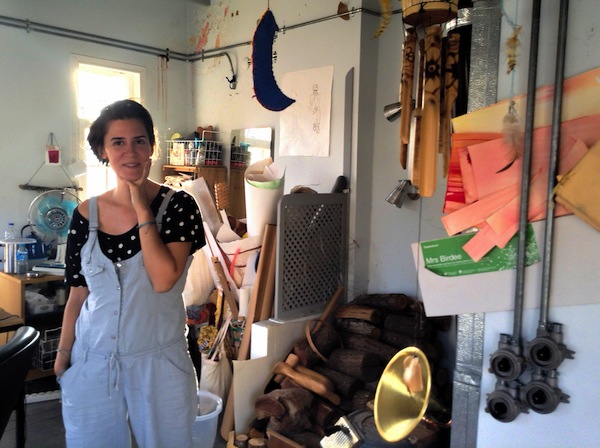
Just behind Kadar Has University stands a dream house. A creative place where only positive energy is welcome and ideas about how to reuse objects rather than throw them away are discussed, shared and put into action. Here is where you’ll find Banu Uğural experimenting (and often succeeding) with ways to reuse the objects that most people just throw away once they’ve lost their purpose. I spent an evening with Banu talking trash and how to give new life to old rubbish.
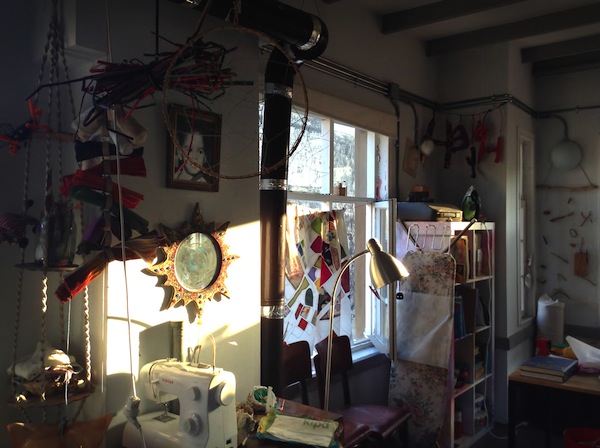
What is upcycling? How did you become interested in this concept?
Upcycling is taking a discarded object that has no value anymore and giving it a new value by reusing it. Reuse it for its shape, for its material and you have to be creative. Instead of buying something to make something, use whatever materials you have available in the house. I became interested in upcycling because I felt responsible for the future generations and wanted to set an example with my actions. I did not want to become part of an industry (my previous profession was fashion design) that is a big part of the consuming culture and use of resources. I want to share what I’ve learned with others in hopes that they will be more aware of the waste they produce and try to reduce it.
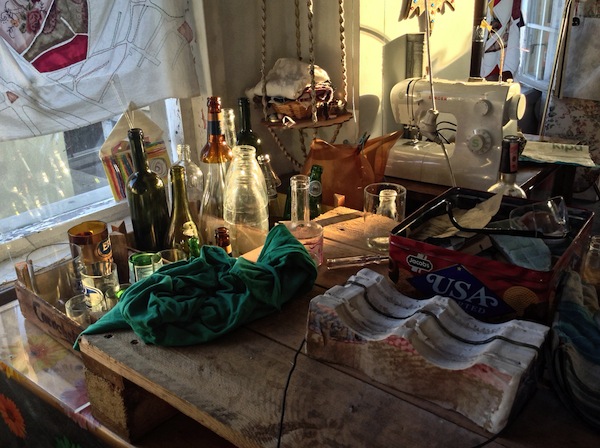
What materials do you use?
It’s always different materials because I feel obliged to use discarded objects. As human beings we take too much from this beautiful earth so I feel responsible to try and find solutions through using my creativity. For example, I’m always collecting plastic bags to weave. I am not only an artist I am a designer. I like solving problems so when I create, I like the object having function. I always think, How can I integrate an object into daily use? My materials are always changing. I use everything… whatever is available. For example, I use newspapers, paper bags, handles from paper bags, bits of fabrics, bottle caps and plastic bags. I’ve been trying to crochet from plastic bags. Every day I am learning and constantly finding and trying out new recipes.
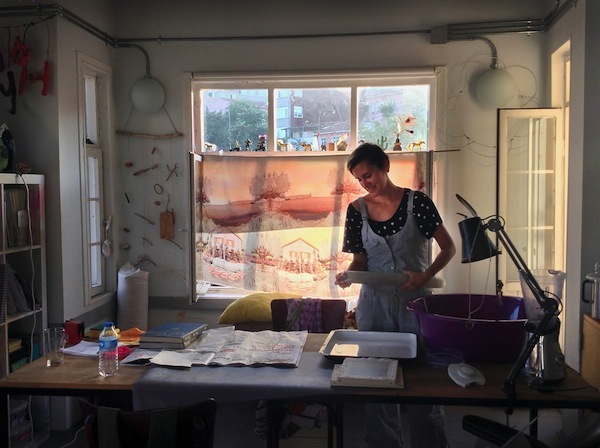
Tell us about your upcycling workshops in villages. How did you become interested in working with people in villages?
I have always been inspired by village people and their ways of living, as an artist. My interest in permaculture led to an invitation to do a workshop in the village of Çınardibi. I share a similar mentality with the villagers: they are the real masters of upcycling, of living in nature and of not giving in to a consumerist society. I feel it is important to reach out to these people and learn from them. This experience led to other upcycling workshops in other parts of Turkey. Then I was invited to Adıyaman and did a workshop in Kayatepe Köyü. I went to Urla where I gave a workshop through a voluntary education program for gypsy children. I also gave a couple workshops here in Istanbul. I create a program for my workshops where we reuse objects that I’ve accumulated and also ask the children to bring objects from their local surroundings to use. I’m trying to be the bridge between village people and city people. To raise awareness about how much trash we create and to be conscious of our actions.
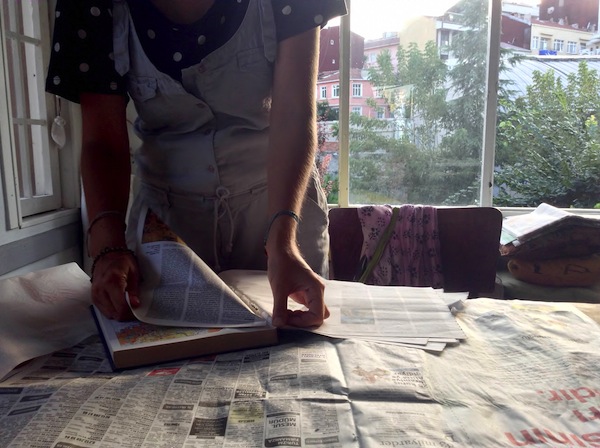
What has been challenging for you regarding your work?
I know I’m doing something good: going to villages, inviting professionals to my studio, trying different disciplines and sharing knowledge. But it’s also difficult. Some days I’m really frustrated and feel very lonely at times. It’s hard to discipline myself so I need to create deadlines, structure and have a project to work on. I’m a team player so I prefer to work like this and try to find solutions together. Sometimes when I’m talking to people and start saying a few negative things about how much we waste as a society, people just tune out and tell me they don’t want to talk about this subject because it’s depressing. This is part of the problem; the subject of waste needs to be discussed if we are ever going to find solutions.
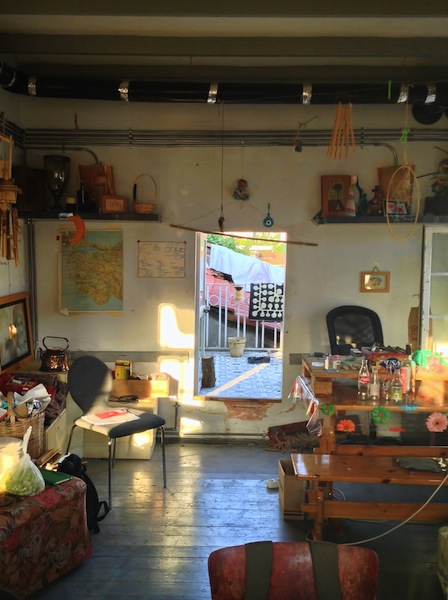
What do you like about living in Istanbul?
The city gives you energy. Every day is a new day; I discover something new and exciting here every day. There’s so much to do. Since Turkey is a developing country, it is unpredictable which makes it flexible and adventurous. It’s all about relationships with people. Living here forces you to be creative, so your creativity is uplifted.
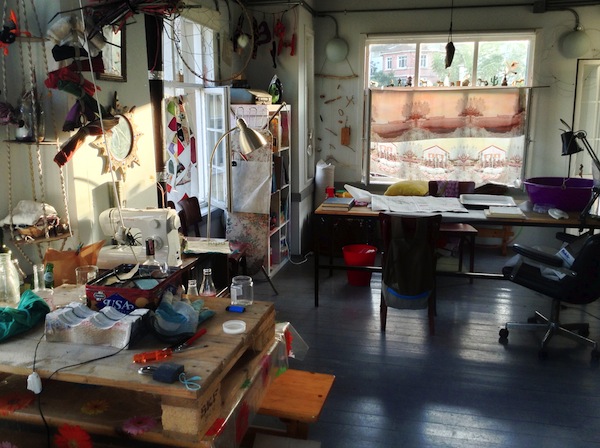
What are your current projects?
I’m always learning – I enjoy being a student. Currently I have been spending more time focusing on how I can empower people and how I could make people co-creators as well. The knowledge should not be sold, it should be shared. I have been a facilitator rather than just a creator. Because we live in a throwaway culture, I have created a platform called Atma Kullan (don’t throw it, use it) to support the movement of upcycling, and the workshops and the gatherings around it.
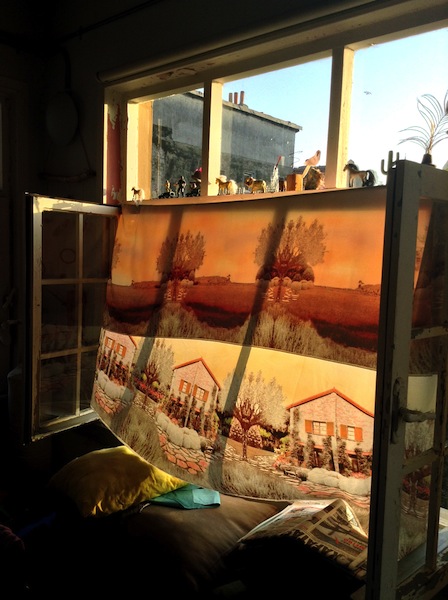
What are your dreams and what do you hope to achieve with the work you’re doing?
To have a mobile studio that goes through villages, upcycling with children. To create a school in a village where I work with the local people and learn from the elderly. I would love to be part of an international team that’s willing to create projects and workshops together. It’s all about being a bridge, about doing something positive just for the sake of being positive. To be connected. To work together. Let’s be connected.
For more information about Banu and her work, you can visit her website and Atma Kullan’s website.
You can also learn more about Banu and what she does in this video about her work [Turkish]:


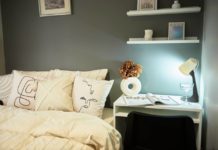






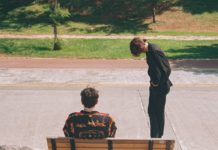
…cool…
BANUCUĞUM. BRAVO SANA .BİR YERLERDEN BAŞLAMAK GEREK .YOKSA HER GEÇEN GÜN KAYNAKLAR TÜKENİYOR . GELECEKNESİLLERE BİR ŞEYLER BIRAKMAK GEREK .YOLUN AÇIK OLSUN
[…] This post was first published here […]